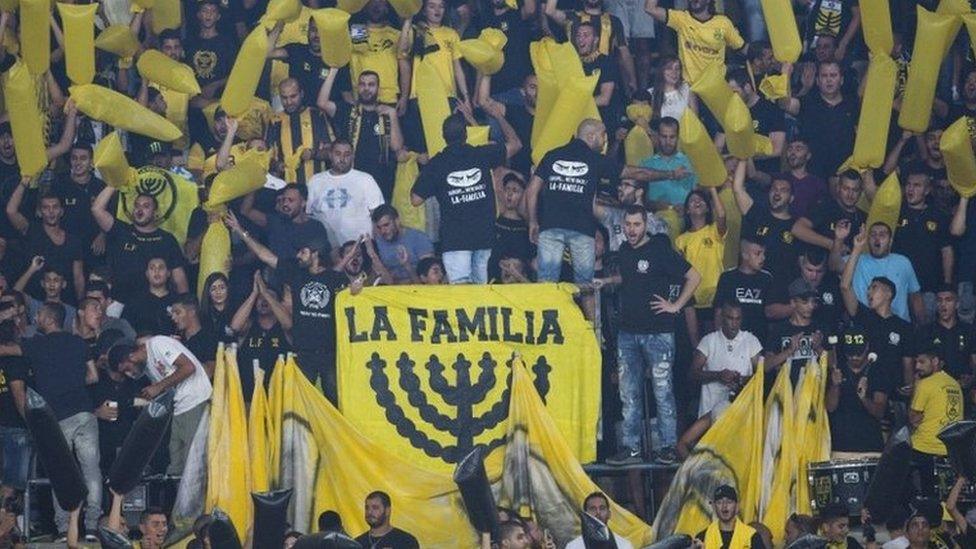Beitar Jerusalem: UAE sheikh buys stake in racism-tainted Israeli club
- Published
Tom Bateman explains how a UAE sheikh came to buy a football club known for having anti-Arab "ultra" fans
An Emirati sheikh has bought a 50% stake in the Israeli football club Beitar Jerusalem, long tainted by accusations of anti-Arab racism.
A club statement said Sheikh Hamad bin Khalifa Al Nahyan would invest $92m (£69m) over the next 10 years.
He declared that he was "thrilled to be a partner in such a glorious club".
The deal comes three months after the United Arab Emirates became the first Gulf Arab state to normalise relations with Israel.
The two countries, and Bahrain, signed an agreement to establish diplomatic relations at the White House in an accord brokered by the Trump administration.
Beitar Jerusalem is one of Israel's top football clubs. It has won six Israeli Premier League titles, most recently in 2007-8, and counts Prime Minister Benjamin Netanyahu among its supporters.
However, the club is well-known for a group of hardcore "ultra" fans, called "La Familia", that has been openly racist towards Arabs, who make up 20% of Israel's population.

Beitar Jerusalem's hardcore ultras are known as "La Familia"
Chants of "Death to Arabs" were regularly heard at matches at Teddy Stadium, and the owners were warned not to sign Arab or Muslim players.
In 2013, the club's offices were set on fire days after it bought in two Chechen Muslim footballers. Two members of La Familia were charged with arson.
Beitar Jerusalem's current owner, Israeli technology entrepreneur Moshe Hogeg, launched an anti-racism campaign after buying the club in 2018.
He told the BBC last December that he had warned fans: "You shout one racist comment and I will sue you for a million dollars."
'How I kicked racism out of my club'
Despite some opposition from supporters, he signed a deal with Sheikh Hamad on Monday that saw the billionaire member of Abu Dhabi's royal family take a 50% stake in Beitar Jerusalem.
In a statement, Mr Hogeg said the move - which comes days before Hanukkah, the Jewish festival of lights - symbolised a "new and exciting light".
"Together, we all march the club to new days of coexistence, achievements and brotherhood for the sake of our club, community and Israeli sports," he added.
Allow X content?
This article contains content provided by X. We ask for your permission before anything is loaded, as they may be using cookies and other technologies. You may want to read X’s cookie policy, external and privacy policy, external before accepting. To view this content choose ‘accept and continue’.

Sheikh Hamad said: "I am thrilled to be a partner in such a glorious club that I have heard so much of and in such a great city, the capital of Israel and one of the holiest cities in the world."
He added: "I have heard a lot about the change taking place in the club and the way things are going, and I am happy to take part in that."
Sheikh Hamad's reference to Jerusalem is potentially controversial, given the city's status is at the heart of Israel's conflict with the Palestinians.
Israel has occupied East Jerusalem since the 1967 Middle East war and regards the entire city as its capital - a position supported only by the Trump administration, Guatemala and Honduras.
The Palestinians claim East Jerusalem as the capital of a future state of their own.
Following its deal to establish diplomatic relations with Israel, the UAE said it remained committed to the establishment of a Palestinian state with East Jerusalem as its capital.